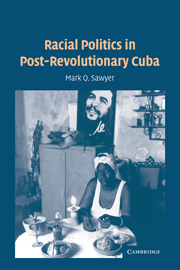Book contents
- Frontmatter
- Contents
- List of Figures and Tables
- Acknowledgments
- Introduction
- 1 Race Cycles, Racial Hierarchy, and Inclusionary Discrimination: A Dynamic Approach
- 2 Freedom and Discrimination: Uneven Inequality and Inclusion in Pre-Revolutionary Cuba
- 3 Race and Revolution: Transformation and Continuity
- 4 Match Made in Heaven or Strange Bedfellows? Black Radicals in Castro's Cuba
- 5 Race and Daily Life in Cuba During the Special Period: Part I: Interview Data
- 6 Race and Daily Life in Cuba During the Special Period: Part Ⅱ: Survey Research
- 7 Racial Politics in Miami: Ninety Miles and a World Away
- Conclusion
- Bibliography
- Index
2 - Freedom and Discrimination: Uneven Inequality and Inclusion in Pre-Revolutionary Cuba
Published online by Cambridge University Press: 05 September 2012
- Frontmatter
- Contents
- List of Figures and Tables
- Acknowledgments
- Introduction
- 1 Race Cycles, Racial Hierarchy, and Inclusionary Discrimination: A Dynamic Approach
- 2 Freedom and Discrimination: Uneven Inequality and Inclusion in Pre-Revolutionary Cuba
- 3 Race and Revolution: Transformation and Continuity
- 4 Match Made in Heaven or Strange Bedfellows? Black Radicals in Castro's Cuba
- 5 Race and Daily Life in Cuba During the Special Period: Part I: Interview Data
- 6 Race and Daily Life in Cuba During the Special Period: Part Ⅱ: Survey Research
- 7 Racial Politics in Miami: Ninety Miles and a World Away
- Conclusion
- Bibliography
- Index
Summary
In order to understand racial politics in post-revolutionary Cuba, we must first understand the set of concerns, interests, fears, anxieties, and problems that surrounded the intertwined processes of the emancipation of people of African descent from the institution of slavery, the struggle for an independent Cuba, and the development of concepts of Cuban citizenship. The bloody transition to independence from Spain and the development of a Cuban nation created a crisis that Afro-Cubans took advantage of by fighting for their freedom. They won emancipation and a measure of formal equality. Later, however, the state consolidated under a Creole elite, using extreme violence to deter Afro-Cubans from pushing for greater equality. While some of the revolutionary gains were lost in this period of consolidation, others were institutionalized. Racial exclusion morphed into a form of discrimination: Cuba maintained a public veneer of racial democracy while Afro-Cubans were denied access to important private organizations, schools, and professional organizations. The pattern of informal discrimination and formal inclusion became an essential part of the trajectory of Cuban racial politics.
Early on in the struggle for independence, the white elites' competing objectives of enlisting the help of blacks in the fight against Spanish colonialism and preventing them from dominating the island influenced both domestic and international discourse about Cuban independence (Dominguez 1978; McGarrity and Cardenas 1995; Helg 1995; Ferrer 1999; Pérez 1999). Later, after the defeat of Spain, the question of what character Cuba would have as a nation became a major dilemma in Cuban life.
- Type
- Chapter
- Information
- Racial Politics in Post-Revolutionary Cuba , pp. 36 - 48Publisher: Cambridge University PressPrint publication year: 2005



